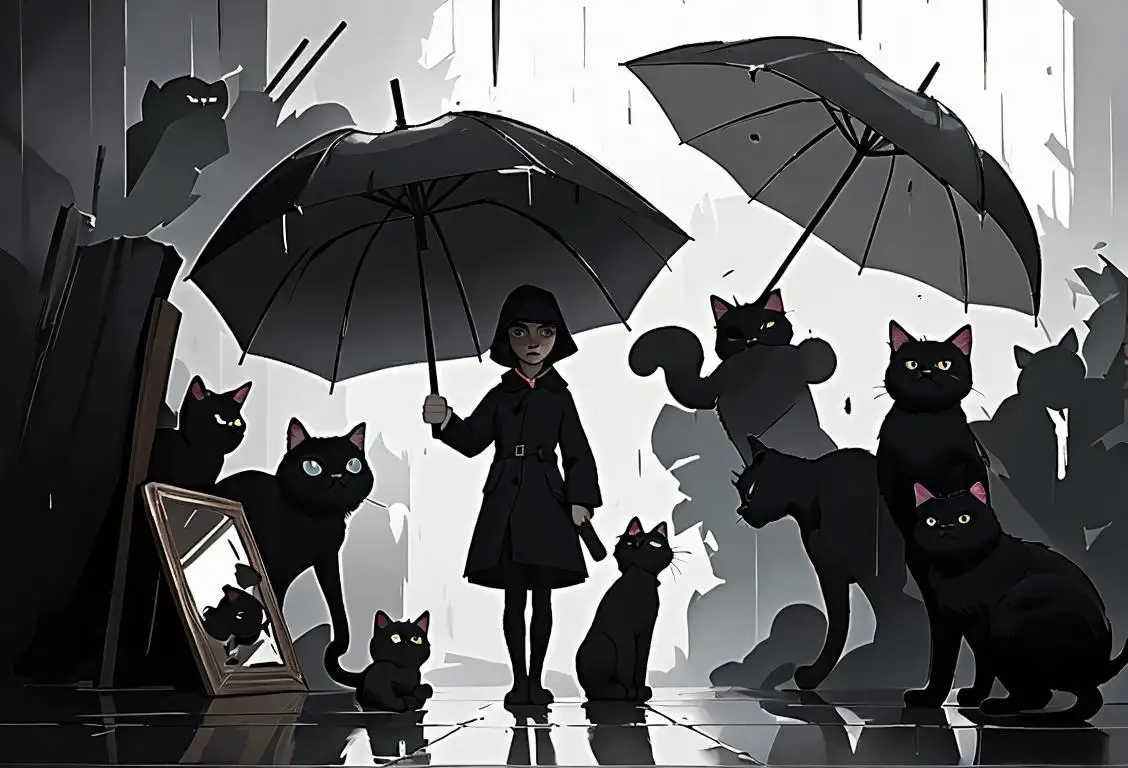National Bad Luck Day

Welcome to National Bad Luck Day, the day when everything that can go wrong, will go wrong! This notorious day, celebrated on May 19th, has become a time for folks to commiserate and laugh at the many mishaps and misfortunes that befall us all. So, buckle up and brace yourself for a wild ride through the history of National Bad Luck Day!
When is Bad Luck Day?
It's national bad luck day on the 19th May.
The Origins of National Bad Luck Day
When it comes to bad luck, it's difficult to pinpoint a specific origin story for this illustrious national day. However, it's safe to say that humans have been blaming their misfortunes on external forces since the dawn of time. From black cats crossing our paths to broken mirrors, we've always found ways to call upon Lady Luck, or her malevolent counterpart, Lady Unluck, as our circumstances dictate.
But it wasn't until the internet era that National Bad Luck Day gained the attention and recognition it deserves. With the rise of social media, people found solace in sharing their tales of woe, creating a virtual support group of sorts for those enduring unfortunate events.
How to Embrace National Bad Luck Day
While we can't control the whims of fate, we can certainly have some fun with it on this special day. Here are a few ways to embrace National Bad Luck Day:
- Loved Ones: Gather your loved ones and share stories of your unluckiest moments. Laughter truly is the best remedy for a case of bad luck.
- Food: Prepare a meal with ingredients that remind you of your unluckiest moments. Burnt cookies, anyone?
- Sports: Organize a friendly (but not too competitive) sports event where luck plays a significant role. Ping pong on a windy day, anyone?
- Remembrance: Reflect on how your past misfortunes have shaped you into the resilient, resourceful person you are today. You're basically a survivor!
Fun Fact about National Bad Luck Day
Did you know that some studies suggest that people who believe they are lucky tend to have better luck in life? So, if you're feeling down on your luck, maybe it's time to start embracing a more positive mindset. Or, you know, you could just blame all your misfortunes on National Bad Luck Day.
History behind the term 'Bad Luck'
Ancient Rome (509 BC - 476 AD)
The Origins of Superstitious Beliefs
During the time of Ancient Rome, people held numerous superstitious beliefs. One such belief was the concept of 'bad omens' or 'ill-fated events'. The Romans believed that certain actions or occurrences could bring about misfortune or bad luck, and they would actively try to avoid these situations.
Medieval Europe (5th - 15th century)
The Influence of Christianity
With the rise of Christianity in Medieval Europe, superstitions became deeply entwined with religious beliefs. The notion of 'bad luck' took on a new dimension as it became associated with sinful behavior or a form of divine punishment. Various practices and symbols were associated with bad luck, such as crossing paths with a black cat or breaking a mirror.
17th Century England
The Fear of the Number 13
During the 17th century in England, the fear of the number 13, known as triskaidekaphobia, gained significant attention. Many people became anxious about encountering the number 13 in everyday life, as it was believed to bring extreme misfortune. This fear of the number 13 still persists in modern culture, leading to the avoidance of the number in many aspects of life.
19th Century Sailors' Superstitions
Unlucky Friday the 13th
In the 19th century, sailor folklore contributed to the notoriety of Friday the 13th as an unlucky day. Sailors believed that setting sail on a Friday would lead to bad luck, as it was believed that Christ was crucified on a Friday. The number 13 was seen as inherently unlucky, and sailors would avoid embarking on important journeys or performing significant tasks on this day.
Early 20th Century
The Origins of 'Bad Luck'
The actual term 'bad luck' began to gain popularity in the early 20th century. It became a catch-all phrase to describe unfortunate events or outcomes. The term 'bad luck' encapsulated the centuries-old beliefs and superstitions that had accumulated over time, resulting in a common expression used to explain undesirable situations.
Did you know?
Did you know that some studies suggest that people who believe they are lucky tend to have better luck in life?Tagged
fun loved ones rememberance sportsFirst identified
19th May 2015Most mentioned on
19th May 2016Total mentions
17Other days
Reach As High As You Can Day
Action Day
Opposite Day
Disability Day
Memorial Day
Bobblehead Day
Happiness Day
Cancer Survivors Day
Trivia Day
One Day









